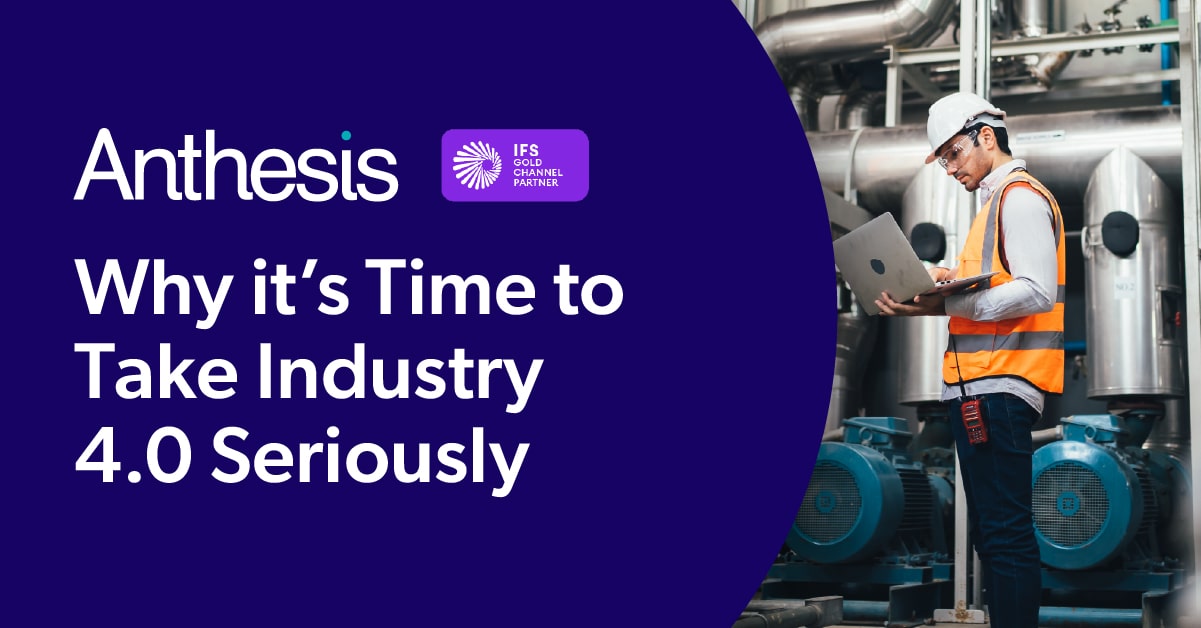Anthesis looks at the role of Industry 4.0 in demonstrating best practice for manufacturers, and how predictive maintenance can improve profitability and offer a new revenue stream in an increasingly unpredictable economy.
These days it seems impossible to miss the extensive coverage and good-news stories associated with companies implementing Internet of Things connectivity, or business evangelists envisaging a future where machines manage themselves.
While intellectual property (IP) was once considered the most important business differentiator, the most valuable commodity in any enterprise today is, without a doubt, data. When you consider that we produce an estimated 2.2 quintillion (1018 ) bytes of data every single day, harnessing and understanding this data in the context of the Internet of Things, is paramount to unlocking the value of this crucial asset.
A smarter way of managing assets
For the vast majority of businesses, the idea of machine feedback and integrated reporting can feel a very long way off indeed. Often scarce investment resources mean only the critical infrastructure of the factory has any kind of data capture against it – for example; silos, vats, and treating ovens.
But this is changing. Recent world events have exacerbated a lack of skilled labour in the workforce, new sustainability goals, increased consumer expectations, cost increases and fluctuations in supplier reliability, all of which have expedited an urgent need to move to a much smarter way of managing assets.
To remain competitive in this world
The need to demonstrate elasticity to cope with fluctuating capacity and demand has never been greater. Championing best practice in efficiency, sustainability, and predictive maintenance, as part of an Internet of Things, or Industry 4.0 strategy, is crucial.
The AI-centric data insights which are borne out of a predictive maintenance framework inform decisions on what to do next based on analysis. For example, insights can predict if a machine is about to fail based on analysis of history and current usage, and then production planning can be re-organised, or certain processes re-mapped, to maintain on track with schedules, or to capitalise on a more cost effective, or profitable activity.
Testament to its value is that a recent study conducted by the McKinsey Global Institute on IoT, shows that downtime can be reduced by up to 50% and maintenance costs by up to 40% (source:RS Components web page) using predictive maintenance.
New revenue models
With this, it is easy to see why the Industry 4.0 revolution is gaining momentum. But have you considered the other reason why the Internet of Things and Industry 4.0 movement could truly be a game changer for you? In industrial machinery, the industry is evolving. Profit is not only restricted to providing the machinery – it has been significnatly outgrown by servicing options.
A PWC annual report suggests 90% of UK manufacturers are beginning to realise the revenue potential of service management for sold and managed machinery (This is shifting the value for the manufacturer into an ongoing operating revenue stream). Service contracts provide recurring revenue, visibility of inventory requirements, and minimise unscheduled maintenance to remove costly downtime for your customers.
Intelligence and profitability
Much more than automation of processes and enhanced workflow, the Internet of Things allows you to monitor and apply intelligence to reduce downtime. It promises the opportunity to predict what parts will be required and increase your profitability, and crucially, extend the scope of your service delivery and the customer experience.
Anthesis sells, delivers and supports IFS Cloud – an enterprise system providing ERP functionality with baked-in service contracts and resource planning . A single-instance, single-product system enabling you to deliver the moment of service for your customers. IFS Cloud helps you to manage service contracts, using standard or ringfenced inventory; schedule and plan workforces and execute service-based tasks on the road like invoicing, creation of new service requests and consumption of van stocks.
Why not contact us to find out how we can help you embrace the value of the Internet of Things? Contact us.



